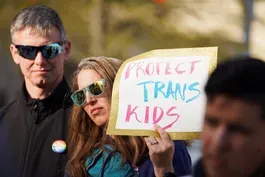
What's in debt agreement and potential effects on economy
Clip: 5/29/2023 | 11m 32sVideo has Closed Captions
What's in the debt limit agreement and its potential effects on the economy
President Biden and House Speaker Kevin McCarthy have a deal to avoid defaulting on the country’s debt, but there's still a threat of economic catastrophe if they can’t sell it to Congress. Lisa Desjardins reports on the bill and the chances of it passing.
Problems with Closed Captions? Closed Captioning Feedback
Problems with Closed Captions? Closed Captioning Feedback
Major corporate funding for the PBS News Hour is provided by BDO, BNSF, Consumer Cellular, American Cruise Lines, and Raymond James. Funding for the PBS NewsHour Weekend is provided by...

What's in debt agreement and potential effects on economy
Clip: 5/29/2023 | 11m 32sVideo has Closed Captions
President Biden and House Speaker Kevin McCarthy have a deal to avoid defaulting on the country’s debt, but there's still a threat of economic catastrophe if they can’t sell it to Congress. Lisa Desjardins reports on the bill and the chances of it passing.
Problems with Closed Captions? Closed Captioning Feedback
How to Watch PBS News Hour
PBS News Hour is available to stream on pbs.org and the free PBS App, available on iPhone, Apple TV, Android TV, Android smartphones, Amazon Fire TV, Amazon Fire Tablet, Roku, Samsung Smart TV, and Vizio.
Providing Support for PBS.org
Learn Moreabout PBS online sponsorshipAMNA NAWAZ: President Joe Biden and House Speaker Kevin McCarthy have a deal to avoid defaulting on the country's debt, but there's still a threat of economic catastrophe if they can't sell it to Congress.
Lisa Desjardins combed through the 99-page bill and is here now with the details and a read on the mood on Capitol Hill.
Lisa, it's great to see you.
You have read the bill, so let's start with the highlights.
Give us a big picture of what it means.
LISA DESJARDINS: The Fiscal Responsibility Act, 99 pages, but we're dealing with very big ideas here.
How large do we want government to be or not?
Let's talk about some of the big bottom lines from this bill from what we saw last night.
First of all, what it would do for spending.
Defense spending would increase next year by 3 percent, not much relative to recent years.
Veterans would be fully funded.
Nondefense spending would decrease slightly.
Now, that depends on sort of what baseline and what math you're using.
Basically, nondefense would stay about the same in this bill.
Now, it would also raise the debt.
It would suspend the debt limit until 2025, January 2025, after we have had the next election.
Let's talk about what it would do for that debt kind of trajectory, which has been so core for Republicans.
This is where we are right now, the current curve, $1.6 trillion dollars.
Let's keep -- this is the spending right now, the U.S., last year.
Here's where the curve was headed before this deal.
Now let's look at what the deal would do if it's passed.
You see it would show that spending would be much less than, about it stabilizes in the end.
Now, some say that that's not enough.
Some Republicans say they want more.
But leaders have been talking about this deal, sending out statements today, including the White House.
President Biden was asked, why didn't he come out in public?
Why isn't he crowing about it more?
Here's what he said.
JOE BIDEN, President of the United States: One of the things that I heard some of you guys saying is, why doesn't Biden said what a good deal is?
Why would Biden be saying what a good deal is before the vote?
You think that's going to help me get it passed?
No.
LISA DESJARDINS: This is part of that needle they all have to thread.
Democrats don't want to say it's too good and scare off Republicans.
Republicans don't want to say it's too good and do the reverse.
AMNA NAWAZ: So, President Biden, Leader McCarthy have to now sell this, right, to members of Congress, some of whom have already been voicing their opposition.
So, let's start with the Democrats.
Where's the debate for them?
LISA DESJARDINS: I want to also talk about what it -- for them, what -- they're looking at who this affects and where it affects.
One thing that's in this bill that is not related directly to the debt is a Mountain Valley pipeline in West Virginia.
Look at that.
This is a controversial project that this bill would essentially fast-track.
It's been waiting for years because environmentalists and some courts have opposed it as dangerous and not well-run.
But this bill, something Joe Manchin, he would get in it from this pipeline.
That's something that progressives say is a huge mistake.
They don't like how it handles environmental permitting in this.
They also don't like that it would essentially stop the freeze on student loan payments.
It would end that in the fall.
They say that's not good for students.
In addition, biggest concern for progressives, work requirements.
We have been talking about that on the show.
Let me tell people what's going to happen, what this bill proposes to do for food stamps, which is where it would make the biggest difference.
First of all, it would extend the current work requirements now to those aged 50 and 54, who are not required to have those work requirements under current law.
Now, it would also exempt veterans, foster youth and those who are experiencing homeless from work requirements.
The White House says, when you put those two things together, you have the same number of people on food stamps.
But there's no question expanding that age for work requirement would mean 100,000 -- 200 or more thousand people would be having those work requirements.
And there's some worry from the left that some would fall off.
On the other hand, Amna, centrist Democrats, the New Democrats, they are 100 members, they seem to be getting behind this bill.
So there are also Democrats who say this is the right way to go.
AMNA NAWAZ: The debate among the Democrats.
What about among the Republicans?
What are we hearing from them?
LISA DESJARDINS: Wow, it is really quite fiery right now in the Republican Conferences on both sides.
There are Republicans -- we have talked about Chip Roy of Texas -- he's important because he sits on the House Rules Committee -- who say this does not cut spending, that keeping spending at the same level more or less is not enough.
Now, he is powerful enough to try and block it in committee in the Rules Committee.
That vote will be tomorrow.
We expect it to be tomorrow.
That's the plan.
Now, in the Senate, we also have a rising tide of concern from some Senate Republicans.
Lindsey Graham, senator from South Carolina, took to Twitter today.
He has a problem because he thinks it does not increase defense spending enough.
He's tweeting here that he will use all of his powers to bring up amendments.
He says there should be like a three-month delay in this process.
That seems unlikely at this point.
But all of this means that we really have concerns on both sides.
And we're at a moment where we don't know which way those concerns will go.
AMNA NAWAZ: We're at a moment as well where the deadline is one week away exactly from today.
LISA DESJARDINS: Yes.
Right.
AMNA NAWAZ: Can they reach that limit?
Can they reach that deadline?
LISA DESJARDINS: All right, I'm going to attempt this on television.
We will see if this work for you guys.
Seven days, right?
OK.
So here's where we are.
Now, it's going to take like three days to get this to the House floor.
Wednesday is the ideal, that it would pass Wednesday on the House floor.
Then it takes another day to get all the way to the Senate.
So then you're dealing with Thursday, Friday.
Most bills take this long in the Senate or this long.
So, to get this through on time, we need senators to agree on a time agreement.
And then you can't have someone like Lindsey Graham or Rand Paul objecting and slowing things down, or else we will run out of time.
It is beyond very close.
They have to thread several needles here at once.
AMNA NAWAZ: I have a feeling it's going to be a very busy week for you.
LISA DESJARDINS: Yes, dramatic.
AMNA NAWAZ: Lisa Desjardins, thank you for staying on top of it.
Lisa Desjardins, kicking us off today, thanks.
Let's focus now a bit more on those questions about what the deal could mean for the economy.
David Wessel joins us here again.
He's the director of the Hutchins Center on Fiscal and Monetary Policy at Brookings.
David, great to see you.
DAVID WESSEL, Brookings Institution: Good to be with you.
AMNA NAWAZ: So, both sides here are claiming victory to some degree.
You heard Lisa's great reporting there on the details so far.
But, as you look at it, from your perspective, what stands out to you about where the compromises were made and what each side -- quote, unquote - - "got" so far?
DAVID WESSEL: Well, I think a lot of stuff in the bill is there so people can say they got something.
And, as Lisa pointed out, that Republicans didn't get all the work requirements they got.
But the Democrats didn't keep work requirements the way they are.
Now, I think the most important thing to remember is this does not solve the nation's debt problem.
The debt will continue to rise.
All of the cuts in this bill are focused on annually appropriated discretionary spending, annually appropriated nondefense spending.
That's only about 10 percent of the budget.
What's driving the debt is Medicare, Medicaid, Social Security, and taxes.
All those were off the table.
So when the debt ceiling expires, the suspension expires in 2025, that happened to be the same year that the 2017 tax cuts expire.
We're going to have a big fight over really long-term fiscal issues, I think.
AMNA NAWAZ: When you look at this deal, now, the limiting the discretionary spending to 1 percent growth, that doesn't even keep up with inflation, right?
So I know the White House does not want to say that's a cut, but do you look at it as a cut?
DAVID WESSEL: Yes, it's a cut, and it's a cut relative to the baseline that the White House and the Congressional Budget Office use.
What's hard here is, we don't know who's going to pay for that.
That remains to be seen, and the 12 appropriation bills will have to be written.
But somebody's budget is not going to be sufficient for them for them to deliver the same services or hire the same number of people they have this year.
AMNA NAWAZ: So I want to ask you about the broader impact we could see here.
Generally speaking, when you see government spending decreasing in the way this bill calls for, what kind of impact could we see on GDP, unemployment generally?
DAVID WESSEL: Sure.
Well, when the government -- the government's going to put less money into the economy than had been projected.
That means there will be a little less economic growth.
The economists who estimate these things say it'll be about between one-tenth and two-tenths of a percent on GDP growth.
So it's negative, but it's not very big.
And whether we have a recession or not will have to do with a lot of other things that are going on in the economy, the Federal Reserve, energy prices, the banking system.
So this will be a minus on the economy, but a small one.
AMNA NAWAZ: What about broader market stability?
I know these talks add a lot of uncertainty, which investors do not like.
Is this at least one good sign?
DAVID WESSEL: Absolutely.
So this takes off -- provided it gets through Congress in the next week, which is a big if, this takes off the table the threat of default and all the hand-wringing about whether the Treasury will run out of money.
And it takes it off the table until January 2025.
So that's one less big worry that the markets and the public have to be concerned about.
AMNA NAWAZ: I want to ask you about a couple of specifics.
This doesn't really add any revenue, right, not that it was intended to, but it does claw back some of that $80 billion that was intended for the IRS, which some estimates said could increase revenues.
What impact could that clawback have?
DAVID WESSEL: Well, the Congressional Budget Office and other experts say that, if you give the IRS money, they get more tax revenue.
So, scaling that back will reduce the amount of money that the IRS will collect.
Now, there was $80 billion approved for the IRS last year.
There's an agreement, although it's not in the text of the bill, to scale that back $20 billion and divert that money to other spending.
But the White House says that the IRS still has access to that $60 billion and can start spending it now.
So, we really don't know what effect it'll have.
But we know the direction, and the Congressional Budget Office will say that we're going to raise less revenue than they would have predicted before.
AMNA NAWAZ: What about some of the details Lisa was just reporting on, on the new work requirements for certain recipients of food stamps, also accelerated permitting for some energy projects?
Do we yet know what kind of economic impact those would have?
DAVID WESSEL: I think the short answer is not much.
Obviously, the work requirements -- the reason people worry about work requirements is not that they don't want people who are on food stamps to work, that they're afraid it becomes a barrier to people getting the benefits to which they're entitled.
So this will hurt some people, but, as Lisa pointed out, other people will be helped.
The permitting stuff is pretty mild.
It sets up some procedures, but it's not nearly the kind of permitting reform that people were looking for.
On the student loans, we're basically at status quo.
The president had said that he expects people to begin paying their student loans 60 days after Supreme Court rules on his proposed forgiveness.
That's now -- what the bill does is he can't stretch that out any longer.
But it doesn't change the status quo.
AMNA NAWAZ: Given where the opposition has been, where we have heard that voiced so far, do you believe President Biden and Leader McCarthy are going to be able to get this to pass?
Can they sell this to each side?
DAVID WESSEL: That's a really good question.
My guess is yes, because I don't think -- I think there are enough members of Congress who don't want the U.S. to default.
Back in 1990 -- I have been here so long, I covered this -- George H.W.
Bush, the president, cut a deal with congressional Republicans that the House rejected, and it took them three weeks to come up with another package that could get another vote, enough votes to get through.
The problem this time is, they don't have three weeks.
So my bet is that this will get through.
But my guess is that there will be some bumpy - - the road will be very bumpy.
AMNA NAWAZ: Bumpy road ahead.
David Wessel, always good to have you here.
Thank you very much.
DAVID WESSEL: You're welcome.
El Paso clinics struggle to care for influx of migrants
Video has Closed Captions
Clip: 5/29/2023 | 4m 7s | Inside the El Paso medical clinics struggling to care for influx of migrants (4m 7s)
Erdogan wins runoff to secure grip on power in Turkey
Video has Closed Captions
Clip: 5/29/2023 | 11m 25s | Turkish President Erdogan wins runoff to secure his grip on power (11m 25s)
Native American fashion aims to reclaim its culture
Video has Closed Captions
Clip: 5/29/2023 | 6m 13s | Native American fashion aims to reclaim its culture with authentic designs (6m 13s)
Remembering and honoring the nation’s fallen on Memorial Day
Video has Closed Captions
Clip: 5/29/2023 | 3m 24s | Remembering and honoring the nation’s fallen on Memorial Day (3m 24s)
Some schools reverse decision to remove officers from campus
Video has Closed Captions
Clip: 5/29/2023 | 5m 50s | School systems consider reversing decision to remove police officers from campus (5m 50s)
State-level battles brewing in America over LGBTQ+ rights
Video has Closed Captions
Clip: 5/29/2023 | 6m 7s | The state-level battles brewing in America over LGBTQ+ rights (6m 7s)
Providing Support for PBS.org
Learn Moreabout PBS online sponsorshipSupport for PBS provided by:
Major corporate funding for the PBS News Hour is provided by BDO, BNSF, Consumer Cellular, American Cruise Lines, and Raymond James. Funding for the PBS NewsHour Weekend is provided by...
















